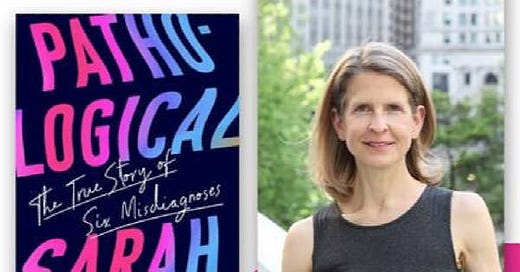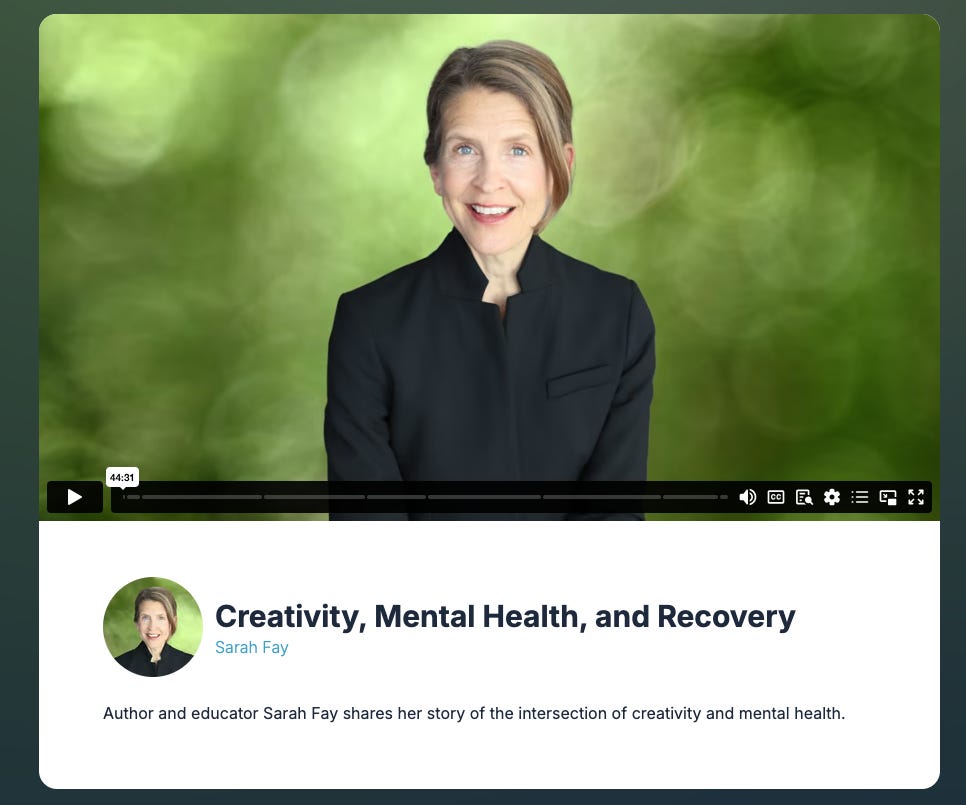Journalist Robert Whitaker, author of books including Mad in America, interviews Sarah Fay about her mental health experiences and her memoir.
This is a brief excerpt from the much longer conversation podcast. My title comes from a comment by Sarah Fay: "I have to admit that I was so attached to my diagnosis, I had defined myself by it."
Source podcast:
The Impact the DSM Has Had On All of Us: An interview with Sarah Fay and Allan Horwitz By Robert Whitaker, Mad in America, April 6, 2022
Sarah Fay, PhD is an author of essays and articles published in the New York Times, the Atlantic and numerous other national publications.
Her related memoir is Pathological: The True Story of Six Misdiagnoses. Links below.
In her newsletter, Fay summarized: "Simply put, Pathological is both a memoir and a work of investigative journalism that...explores the ways we pathologize human experiences and emotions."
She quotes a review:
"Over thirty years, doctors diagnosed Sarah Fay with six different mental illnesses—anorexia, major depressive disorder (MDD), anxiety disorder, attention deficit hyperactivity disorder (ADHD), obsessive-compulsive disorder (OCD), and bipolar disorder.
"Pathological is the gripping story of what it was like to live with those diagnoses, and the crippling impact each had on her life. It is also a rigorous investigation into the Diagnostic and Statistical Manual of Mental Disorders (DSM)—psychiatry’s “bible,” the manual from which all mental illness diagnoses come.
"Yet as Fay found out, some of our most prominent psychiatrists have been trying to warn us that the DSM is fiction sold to the public as fact.
"In Pathological, former advisory editor at The Paris Review and award-winning writer Fay calls for a new conversation about mental health diagnosis, one based on rigorous transparency.
"With exquisite detail and a precise presentation of fact, she digs up her own life at the root to finally ask, Is a diagnosis a lifeline or a self-fulfilling prophecy?"
Pathological: The True Story of Six Misdiagnoses [Amzon] [Bookshop]
Her Substack site & book Cured: The Memoir: curedthememoir
~~~
Also see her video interview “Creativity, Mental Health, and Recovery” at the Anxiety Super Conference Sept 28-30 (2024). Register free
~~~
See related posts below.
Transcript for this podcast excerpt - copied from page for the source podcast: The Impact the DSM Has Had On All of Us: An interview with Sarah Fay and Allan Horwitz By Robert Whitaker.
Whitaker: So instead of being understood that you have these things going on in your life that can be very problematic for a child, you were told the problem was within you. And it seems that you began adopting behaviors to prove to yourself that you had anorexia.
Fay: No, no, it wasn’t that I was faking. It was absolutely in keeping with what I was experiencing in my body, with a stomachache and not wanting to eat. And it was very much in keeping with the weight I was losing. I mean, my weight was dangerously low, but it really became extreme once I started being an anorexic and thinking of myself that way.
And because I was so young, that’s when you are figuring out your identity, that’s when you are trying on different identities. That’s what worries me and one of the reasons I wrote the book.
I teach at Northwestern and I see it in my students all the time, that they are identifying so strongly with the diagnoses they’ve been given, and it’s at that time when you’re just trying things on and you’re so vulnerable.
Whitaker: This goes back to what Allan said. When I was growing up in the 1960s, you just didn’t have people being presented with this possible identity. There were bullies, goof offs, screw ups, that sort of thing, but you weren’t presented with the opportunity to become a mental patient at age 12. But you are now introduced into an identity that’s going to carry forward with you for decades.
Fay: Exactly, and I think it’s really important to note that my primary care physician gave me the diagnosis. We often talk about psychiatrists, but five of my six diagnoses came from primary care physicians whom I saw for about 15 minutes once a year. If you have a man in a white coat with a stethoscope giving you a diagnosis, why would you ever question its scientific validity, its medical soundness or its reliability?
Whitaker: As this happens, what are you saying to yourself? First, you have anorexia, but now you have depression. Are you saying that the depression was undiagnosed before?
Fay: This is the late 90s. Diagnoses were not talked about in the public discourse the way they are now. When I was receiving these diagnoses, they were pretty new to me. I didn’t have people I could talk to about it, but what had happened was with the anorexia diagnosis, I already saw life through a lens of diagnosis.
When there’s a problem, you look for the solution and the solution is a diagnosis, right? When I was told that I had major depressive disorder, I was grieving very seriously. It just happened to be for my cat of 16 years, but it was very difficult for me, and I grieved for about two years and was over-exercising.
I was crying all the time and experiencing what this one doctor saw as signs and symptoms of major depressive disorder, but because I already saw life through the lens of diagnosis, I accepted the major depression diagnosis more readily.
Whitaker: Allan talked about how a diagnosis begets treatment. As you look back on your exposure to different drugs, can you see in any way how the drug treatment itself began to stir a different you, and perhaps even helped push you into these different diagnostic categories?
Fay: What is interesting about that is at the time I was first diagnosed, they weren’t giving anorexics medication. I never received a medication until I was in my late 30s. I had already received all these diagnoses, but I was the kind of person who wouldn’t take aspirin. I was just very anti-medication. I was scared of what it was going to do to me, and I think what else is important is I tried everything.
Often people with mental illness, and I am someone with a mental illness or who had one, depending on how we think about it, are shamed by relying too easily on a drug. I really did everything I could. I meditated, I practiced yoga for 20 years. I tried everything, Chinese herbs, I did DBT, CBT, ACT, I mean, all these things that were supposed to help.
Cognitive Behavioral Therapy is an alternative to psychotropic drugs, but it also reified my diagnosis. It still said I was treating my diagnosis, but I will say that as soon as I was on the medication path, it went very fast.
I had been given Valium when I was diagnosed with generalized anxiety disorder, but later, once I was given an antidepressant and then I started getting other diagnoses, I was put on ADHD medication, then taken off that, then the mood stabilizers came in, then lithium, then antipsychotics.
And I think, to your point, the really important thing was I stopped questioning the drugs too, because if you’re not questioning the diagnosis, you’re not going to question the treatment that much, because why would you?
I thought we were getting to the bottom of it, I thought we were just getting to the answer. I had akathisia—I had horrible side effects from antipsychotics, which is where you just feel like you’re crawling out of your skin and you can’t stop moving. It was awful and yet I still wanted to stay on the medication, because I thought, oh, it’s got to get better, and that this is the answer.
Whitaker: You’ve talked about how this lens of diagnosis really shaped your life. How did you change your thinking? And what was that like to change your thinking, when you started saying that maybe these diagnoses aren’t valid?
Fay: I was at this point in my 40s and I was in crisis. I had been suicidal on and off for about a year. I had been diagnosed at that point with bipolar I, and I had a falling out with my psychiatrist who was also my therapist, and the falling out came because I started to see that when your therapist and your psychiatrist are the same person, you have no one to talk to you about your meds. And so I had asked him, can I see someone else for therapy and continue to see you for psychiatry? And he said, no.
I was going to just walk out, but I was just about out of my medication, and I said I need you to refill my prescription and he wouldn’t do that. I was at that time extremely fragile, and so the idea of finding a new psychiatrist or finding a new primary care physician seemed completely beyond me, but luckily, I am one of those fairly rare people who had the support of my family, and my sister found a new psychiatrist.
I went to see him, and we had our 27-minute or 34-minute first session, and I waited at the end for him to proclaim from on high what diagnosis I had, whether it was a new diagnosis or whether he would reify the old diagnosis. He looked at me, and he said, “I don’t know what you have,” and my whole world changed.
He’s still my psychiatrist because I was so grateful to him for his transparency. I didn’t actually know what to do with that information, but not only did I start to see myself differently, but the whole world. That afternoon I remember walking out of his office and walking down Chicago Avenue in Chicago and it just seemed crisper, it was colder, but it was also more vibrant, and it was like someone just told me the truth.
Then I started researching. I wanted to know everything about mental health diagnoses, I had never heard of the DSM, and I just took it upon myself as a writer to find out everything I could.
I have to admit that I was so attached to my diagnosis, I had defined myself by it. I mean, I had filed for disability at one of my universities.
Did I have a disability? Did I not have a disability? Do I have a mental illness? Do I not have a mental illness? I was suicidal. I didn’t know what to do with all the information that I had and I’m very fortunate that I had a purpose and that I had my research and then eventually the writing of my book to carry me through that time.
~~~~~~
A few of my related Creative Mind posts or podcast episodes:
Do We Need Mental or Emotional Pain To Be Creative?
Gifted, creative people – mental health and misdiagnosis
~~~~



















Share this post